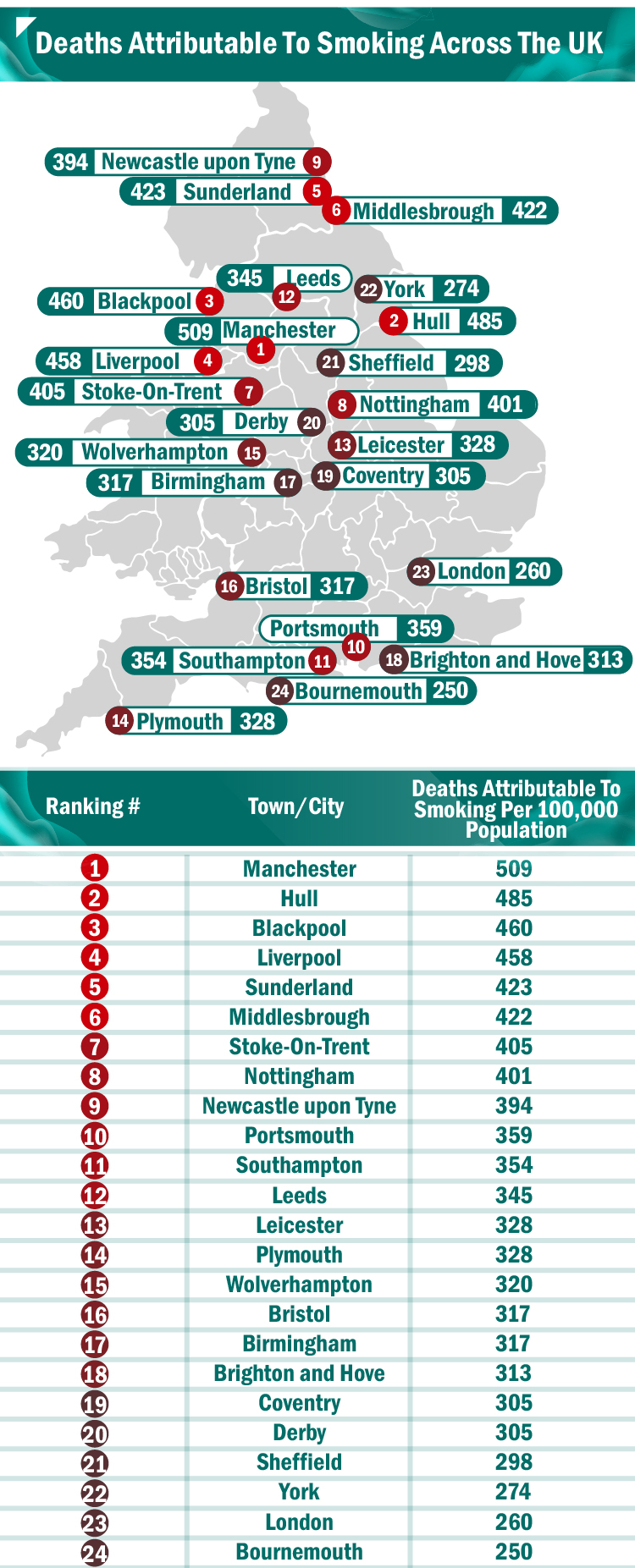Analysis of ‘Statistics on Smoking: England (2017)’ reveals the number of deaths attributable to smoking in different towns/cities across the UK, per 100,000 of the local population.
Overall, their figures showed that there were an estimated 79,100 deaths attributable to smoking in in 2015. Of those deaths: 54% were cancer-related (lung, cervical, bladder cancer etc), 47% due to respiratory illnesses (chronic airway obstruction etc) and 13% circulatory illnesses (ischaemic heart disease, atherosclerosis etc).
The figures demonstrated that deaths were significantly down from the 88,100 recorded 10 years (2005) before, but slightly increased on the 77,800 the year (2014) before.
UK Breakdown
Vapourlites.com investigated the number of deaths attribute to smoking, by analysing statistics taken NHS figures. From 2013 to 2015, Manchester had the highest number of deaths attributed to smoking at 509 per 100,000 of their population out of all the selected major towns and cities for the research. Manchester was closely followed by Hull, who had 485 deaths per 100,000 of their population in relation to smoking. In third place was Blackpool, who had 460 deaths attributable to smoking per 100,000 of their population.
On the other end of the scale, Bournemouth had the lowest number of deaths attributed to smoking at 250 per 100,000 of their population; half that of Manchester. Just above Bournemouth was London, whom had 260 deaths attributed to smoking per 100,000 of their large population.
Share this Image On Your Site
Current Smoking Statistics
In 2016, 15.8% of Great Britain’s population smoked, the equivalent of 7.6 million people. Of those 7.6 million smokers, 17.7% were men compared to 14.1% of women. Men on average also smoked more cigarettes (12 cigarettes) per a day compared to women (11 cigarettes).
Smoking The Silent Killer
Chemicals – Whenever a cigarette burns, it releases more than 5,000 deadly chemicals. Many of the chemicals are unfortunately poisonous and as found by the International Agency for Research on Cancer (IARC), more than 70 are known to cause cancer. Other research has also revealed that toxic metals in tobacco such as lead and arsenic can adversely stop a human body’s cells from repairing any DNA damage.
Lung Cancer – According to Cancer Research UK’, more than 4 in 5 lung cancers are caused by smoking. Studies from Million Women and British doctors have shown that people who smoke between 1 and 14 cigarettes on a daily basis are at least seven times more likely to die from lung cancer compared to a person that has never smoked before.
Heart Attacks – The British Heart Foundation states that smokers are almost twice as likely to have a heart attack compared to someone who has never smoked before.
Circulation – Tobacco contains chemicals which can cause of a lot of damage to the lining of blood vessels and affect the lipids (level of fats) on the bloodstream. In turn, this can result in the hardening of the arteries. Typically referred to as atheroma, it is one of the main causes of heath disease and strokes.
Chronic Obstructive Pulmonary Disease (COPD) – COPD transpires when the lungs become damaged, narrowed or inflamed. As a result, it detrimentally causes breathing difficulties. Smoking is attributed as one of the cause of COPD.
Photo credit: MSSA/Shutterstock
Charles Bloom, Managing Director of Vapourlites.com commented:
“Smoking for a numerous amount of years has been documented as one of the most preventable causes of various deadly diseases and illnesses. Despite this, many do unfortunately become fixated to the addictive nature of smoking and make it a routine habit in their daily lives. Changing this behaviour can be difficult but with more safer alternatives to smoking than ever before and ground-breaking studies/research thoroughly exhibiting the destructive nature of long-term smoking on mental as well as physical health, the glowing hope is that many more lives in the future will be saved”.
Photo credit: vchal/Shutterstock




